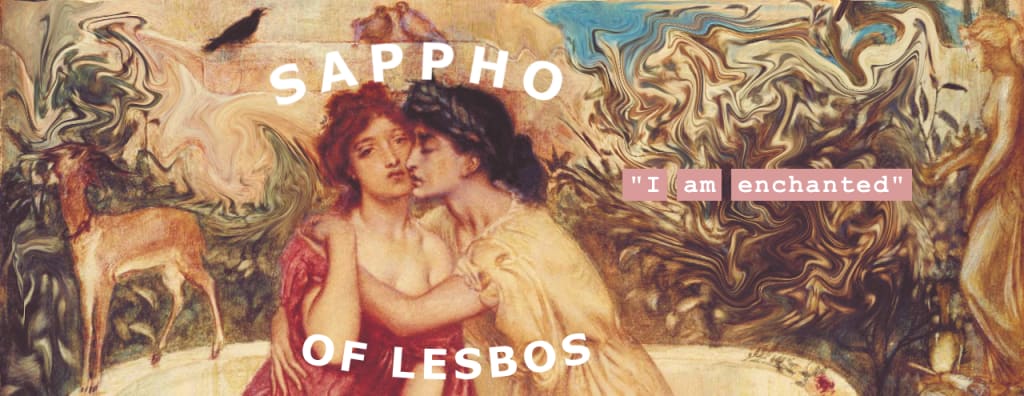
Sappho was a woman-loving, passionate, defiant, heartbroken, lyrical poet. She set the path for lesbian artists openly sharing their love in their work. Being vulnerable is such a challenge, when LGBTQ+ artists have always been told to do the opposite, “keep it private.” Sappho did the opposite and not only has the legend of her talent lasted for thousands of years, but her influence has even altered the English language! Sappho’s work may also feel familiar to those who have, like myself, been in a long-distance relationship. Her poems cry out with the heartbreak in the unwilling parting between her girlfriend and herself. She even pleads to Aphrodite, the goddess of love, to see the woman she loves most again.
Let’s dig into the fascinating, loving, and luxurious life of Sappho. We will let the art teach us about the artist while discovering the few facts that remain about her life, rumors, and eventually the legacy that the Greek poet left behind.
Sappho’s Origin:
Sappho was a lesbian. As in, she was born and raised on Lesbos, an island that lies on the edge of the Greek world. 650-600 B.C was a politically charged time for the small island, so much so that Sappho was exiled to Italy twice in her lifetime due to conflicts with the Island’s political elites. She was born into wealth and privilege, which you can sense while reading her poetry which drip’s with the feeling of luxury, even in tragedy. This luxury spills into her work by way of perfumes and well-dressed women. Sappho dedicated her life to creating and sharing poems meant for singing. A lyre accommodated her poetic reading’s, which may have been played by her girlfriend, Gongyla.
The themes for these poems were often full of passion, love, and longing for other women. Worship for her favorite goddess, Aphrodite, also makeys many appearances in her verses. Fellow Greek academics such as Solon and Plato adored Sappho’s poetry! Solon, one of the Seven Sages of Greece, overheard his nephew singing one of Sappho’s songs. Solon loved it so much that he asked his nephew to teach it to him. When the nephew asked why he wanted to learn the song so badly, Solon responded “So that I may learn it, then die'." Plato often referred to Sappho as “the tenth Muse” after the nine immortal muses in Greek Mythology. While Sappho may be a mortal, her work And influence will always live on.
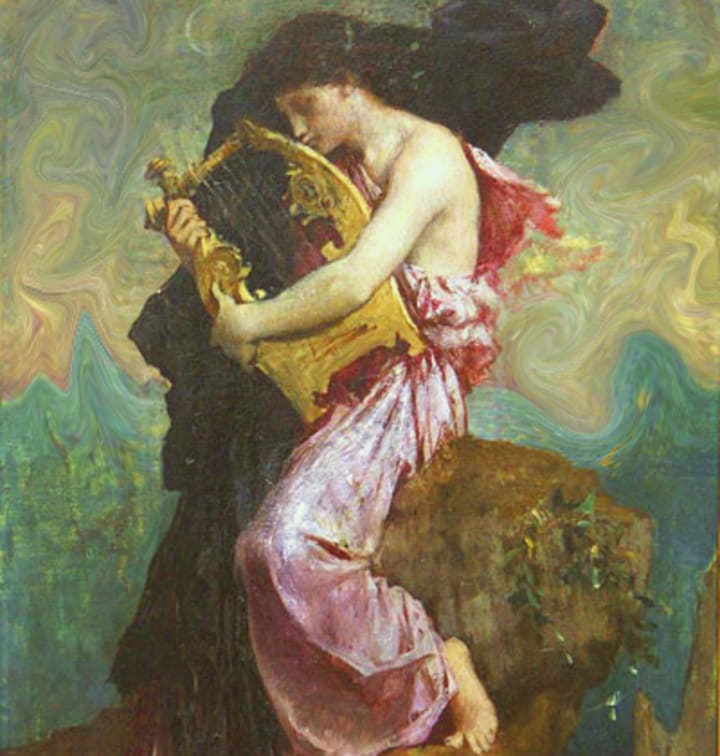
Poems:
Only a handful of Sappho’s manuscripts have been uncovered today. “I Have Not Had One Word From Her” and “Please” both display the passion and rhythm she became famous for. Sappho referred to her poems as her “immortal daughter’s”, and they have proven to be so.
I) ‘I have not had one word from her‘
“Frankly I wish I were dead
When she left, she wept
a great deal; she said to me, "This parting must be
endured, Sappho. I go unwillingly."
I said, "Go, and be happy
but remember (you know
well) whom you leave shackled by love
"If you forget me, think
of our gifts to Aphrodite
and all the loveliness that we shared
"all the violet tiaras,
braided rosebuds, dill and
crocus twined around your young neck
"myrrh poured on your head
and on soft mats girls with
all that they most wished for beside them
while no voices chanted
choruses without ours,
no woodlot bloomed in spring without song."
II) ‘Please’
“Come back to me, Gongyla, here tonight,
You, my rose, with your Lydian lyre.
There hovers forever around you delight:
A beauty desired.
Even your garment plunders my eyes.
I am enchanted: I who once
Complained to the Cyprus-born goddess,
Whom I now beseech
Never to let this lose me grace
But rather bring you back to me:
Amongst all mortal women the one
I most wish to see.”
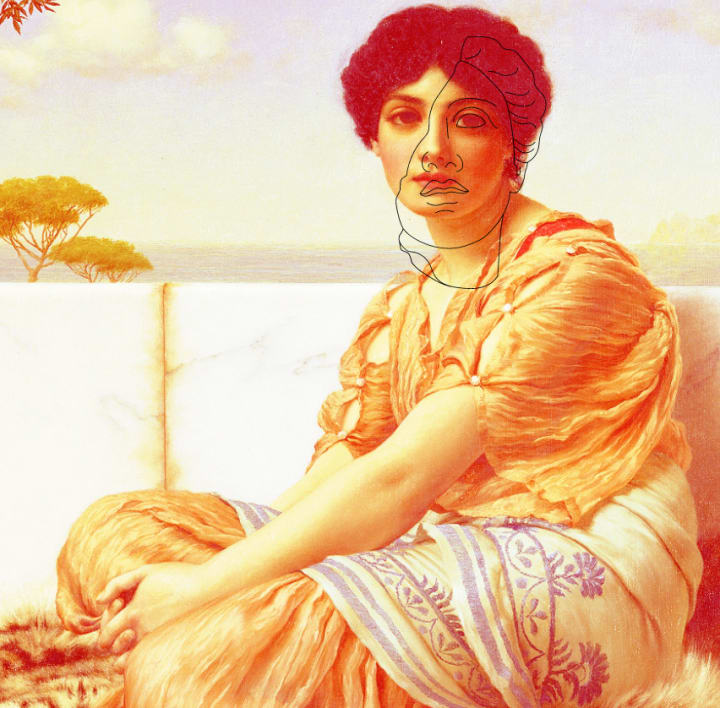
Rumors:
A forced narrative of heterosexuality has plagued Sappho’s existence. As there is no known cause of her death, later poets took it upon themselves to make one up. They claimed that she jumped from a rocky cliff, suicidal after her feelings for a ferryman were unreturned. The legend most likely resulted in part from a desire to assert Sappho as heterosexual, a far more comfortable narrative for traditional poets to tell. The theory has also been widely rejected by historians present day and as far back as Greek writers in 64 B.C. Menander (the man who originated the rumor regarding her suicide) was most likely making fun of romantic love by having a woman known for her lesbian love poetry kill herself over a man. Interestingly, Artemisia I of Caria (c. 480 BCE), another strong woman of note, was also said to have committed suicide by throwing herself into the sea from the same spot. Artemisia's suicide story has also been discredited.
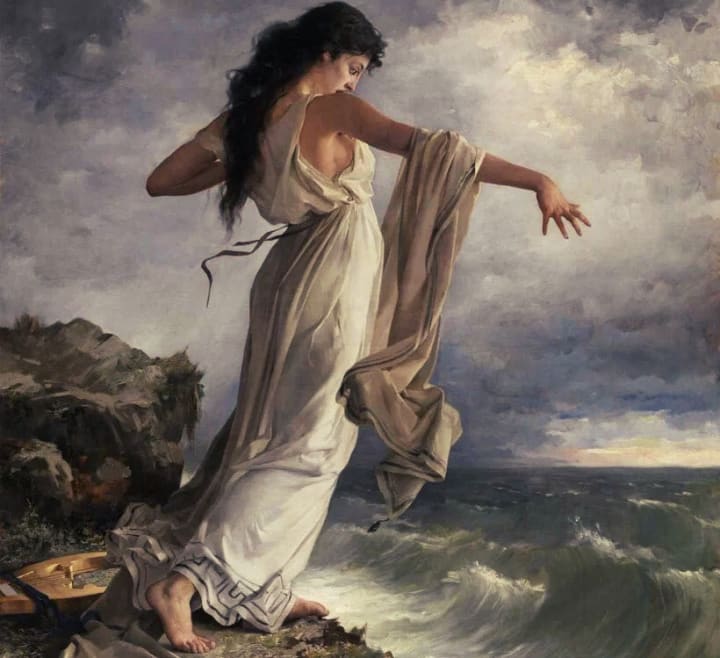
The Legacy:
As the mortal muse, Sappho lives today in both legend and language. The term “sapphic” (relating to lesbians, lesbianism) and even “Lesbian” derives from the Lesbian poet herself and the island she was born on! Her poems have such influence over poets today, that the term “sapphic stanza” was created to describe a poem’s verse form spanning four lines. Her work teaches us about vulnerability, longing, and love. She cleared a path for lesbian artists to follow, and other “outcast” lovers alike.

You can find recent articles by Kasey Rae here:
Hercules and His Triumph over the Flesh-Eating Mares of Ancient Greece
Discover her art: @femme_galaxy.ink on instagram and @ink_femme on twitter.
Please consider tipping the author if you enjoyed the article!
About the Creator
Kasey Rae
Kasey Rae is a New York City filmmaker, writer, and multi-media artist. She focuses on film, mythology, literature, and more.
Art: @femme_galaxy.ink on instagram


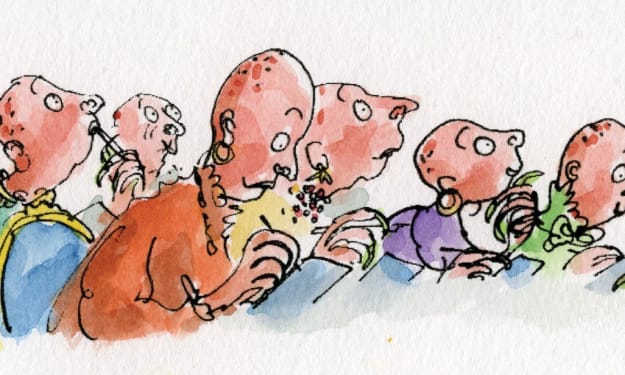



Comments
There are no comments for this story
Be the first to respond and start the conversation.